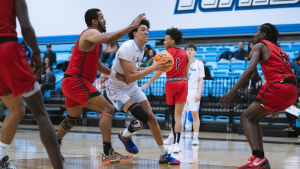Reports of sexual harassment at Moorpark are rising
Dean Jennifer Kalfsbeek-Goetz answers the question of Nathan Espinosa regarding sexual assault during a lecture on Title IX for the Journalism M02 class in the Technology Building on Sept. 1, 2016. Photo credit: Willem Schep
September 12, 2016
Reports of sexual harassment have been on the rise from 2015 to 2016 at Moorpark College, resulting in a need for a clearer understanding of Title IX, the federal law protecting gender equity in federally funded schools.
Between spring 2015 and spring 2016, reports of sexual harassment through Title IX rose from zero to 12 on Moorpark College’s campus. Males and female alike are victims of not only assault, but harassment and stalking as well.
Title IX coordinator and dean of student learning Jennifer Kalfsbeek-Goetz has been fighting for the rights of these victims since she was first assigned to Title IX 15 months ago.
“These things have been happening since I was a kid in college,” Goetz said. “It was just one of those unfortunate college experiences that you dealt with and you looked the other way. Now we’re saying that’s not good enough.”
Title IX was passed as a portion of the United States Education Amendments of 1972. It was designed so that no one would face discrimination based on their gender or sex by federally funded educational institutions. Initially, the amendment was created to allow equal opportunity for female athletes to gain better access to funding and scholarships.
In more recent years, it has been used in an attempt to reduce sexual harassment on campuses across the country. Goetz has been working to increase awareness of Title IX on campus since becoming coordinator.
Part of the plan to increase student awareness includes a Title IX informational video that pops up when students login to their MyVCCCD portal. But many students, like 17-year-old engineering major Dominic Perrino, still haven’t taken the time to watch it.
“I’m not gonna sexually harass anyone,” Perrino said. “So why bother?”
While many think sexual violations involve assault or rape, most of the Title IX cases are related to harassment, including stalking or sending inappropriate communications through text message or social media.
“A lot of the time students don’t understand that certain behaviors are harassment,” said Goetz. “It’s not uncommon that the person being accused is sort of surprised.”
With the California legislature recently passing the Yes Means Yes law, which defines consent as saying yes rather than a lack of a rejection, the definition of sexual harassment becomes wider. Now a person under the influence of any mind-altering substance, such as drugs, alcohol or prescription painkillers, no longer has the ability to consent. While this widened definition of sexual harassment may be a cause of why reports are increasing, Goetz sees other reasons for the surge.
“What I know is that, as I’m raising awareness, I’m increasing the number of cases that we’re going to hear about,” said Goetz. “It doesn’t mean we’re increasing the number of cases that exist, but now we’re actually talking about it and dealing with it.”
If a student has been sexually harassed or assaulted, Goetz recommends they visit her office at AA-101 or talk to a superior that they trust, such as a professor or the health center.
“Sometimes all [a victim] needs to know is that they’re not crazy,” said Goetz. “In many instances, that can be enough.”






